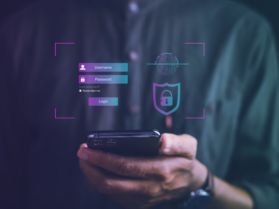Have you ever left your wallet behind in a busy station or randomly gave your home key to a stranger most of us, well wouldn’t dare. And yet, many of us take it for granted when it comes to online security and easily put our personal details into the hands of cybercriminals. Being safe online should be on the top of your priority list and that starts with you!
Hackers are constantly preying on users to trick. The FBI's Internet Crime Complaint Center reports that victims of cybercrime have lost $37.4 billion to scammers over the last five years. Another thing is that scammers are also opting for AI tools to perform fraud and online scams.
Thus, all you need to do is follow the best possible practices to combat online scams and sound digital presence while unleashing the full benefits of the internet.
Here’s a guide that explains how you can identify online scams, top practices to be secure online and more.
So, without any further ado, let’s get started!
How to Identify Online Scams: Check Out the Warning Signs
The following are some of the warning signs you need to keep an eye on to combat online scams.
- Email received from an unknown source or a name.
- Messages that create a sense of urgency seeking a particular action.
- Links to malicious websites.
- Exciting rewards or offers can be an entry point to scams.
- Messages that seem legitimate but aren't.
Some Key Internet Threats
Certainly, everyone is a part of some or the other online platform. Say, browsing social media, filling out a form online, shopping, and the list continues. Moreover, cybercriminals are constantly finding ways to exploit your digital data, in short, the data you share online. This comes in different forms, as given below:
- Identity theft
- Texting scams
- Website scams
- Malware and viruses
- Fake online platforms
- Cyberbullying
Top Tips to Be Safe Online
Below are some of the easy ways you can incorporate to be safe in today’s online world.
1. Make Strong, Safe Passwords
Passwords are also the key parameter to ensuring security. Make sure to have a strong password to safeguard your digital presence. Have a mix of letters, numbers, and special characters – use at least 16 characters. Don’t go with your name, phone number, etc.
A few good lines for strong passwords:
- Make use of a password generator
- Mix the case of random words and add symbols
- Never share your passwords with anyone
A good, one-of-a-kind password per account serves to keep hackers at bay.
2. Read Twice Before You Trust
Fake information is spread everywhere in today’s digital world. Make sure to double-check the information you read online. Be it any discount offers, seminars, or a website asking for money to get good returns. There can be different ways through which users might get fooled. Go with reliable websites that publish original information. Think twice before you read anything online.
3. Connect Carefully Online
Billions of online users consider online platforms for communication. Indeed, each of them may not be trustworthy. Don’t share your personal information with unknown people you meet online. This may be a common way by which hackers lead innocent internet users into divulging confidential information via phishing emails or imitation websites that duplicate the official services, frequently resulting in identity theft or outright theft of funds directly from their accounts.
4. Log Out After Every Online Activity
Suppose you’re making an online banking transaction. Here, you log in with your customer ID and password, and leave the window open. This can become the entry point for a cyberattack as bad actors trick your browser and gain unauthorized access to your account. Further, attempt to steal your personal information and money.
5. Update Your Software Regularly
Hackers are always on the hunt for weaknesses in the software. So, make sure to update your software regularly. They are extremely important to keep your device secure against incoming cyberthreats. Staying up to date is not a big job! All you need to do is enable the automatic update option on your system, and you’ll always be using the most secure and latest version.
6. Take Backups in First Place
Even the top machines may be corrupted if found in the hands of hackers. Thus, it’s a good way to have a backup of your important data to mitigate the risk of losing it due to malware, identity theft, or more. The backup can be stored in external hardware or cloud storage. In short, backups are your saviors, meaning you can restore them immediately and access them if your system is corrupted and data is compromised.
Keeping You Safe Online: The Final Words
Protecting your online identity must be a first job. With cyberattacks growing at the fastest pace, it’s crucial to adopt the best cybersecurity strategies that will keep you safe online. I hope the above-discussed pointers help in safeguarding your digital security.
To read more cybersecurity-related blogs, head over to our website now.
You May Also Like to Read -
Online Privacy: What Is It and Why Is It Important?
The Best Practises to Ensure Online Payment Security






